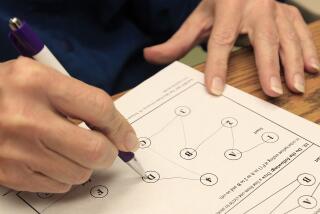U.S. researchers are trying a series of life hacks to try to ward off dementia

- Share via
Facing a predicted tidal wave of dementia sufferers, researchers across the United States are launching an ambitious clinical trial to test whether a package of low-tech life hacks can do something no pill or therapy currently can: prevent or delay cognitive impairment in Americans.
The planned clinical trial, announced Wednesday at the Alzheimer’s Assn.’s International Conference in London, is a bid to test whether a strategy shown to improve cognitive aging in a group of Finns at elevated risk of dementia might also work in a larger and much more diverse population of Americans.
Researchers intend to recruit 2,500 Americans between ages 60 and 79 who have no evidence of dementia but have some risk factors for developing the condition, including obesity, diabetes, high blood pressure, a sedentary lifestyle or a family history of dementia. Over two years, half of the trial’s subjects would participate in an intensive series of sessions aimed at improving their mental and cardiovascular health, their physical fitness and their diets.
Funded by the Alzheimer’s Assn., the $20-million study plans to begin recruiting participants in 2018.
The trial’s interventions amount to a comprehensive health and lifestyle makeover.
Participants randomly assigned to this group will get attentive management of their hypertension, blood lipids and metabolic problems, plus weight-loss support if they’re overweight or obese. They’ll begin a program of social and intellectual engagement, including psychologist-led exercises in memory and reasoning, and computer-based training sessions to sharpen their ability to detect and respond to stimuli. They’ll get counseling to shift their diet away from red meats and sugar and toward fish, fruits and vegetables, healthy fats and whole grains. And they’ll be led through a steady regimen of aerobic and resistance exercise.
The other study participants will get advice on health and aging, dispensed at group meetings, and annual feedback on lab tests.
Upon enrollment and after two years, researchers will give all subjects a battery of neuropsychological tests designed to measure the strength of their episodic memory — the ability to remember and identify people, places and past experiences — and executive function — the ability to analyze, reason, plan and organize.
The FINGER trial — short for Finnish Geriatric Intervention Study to Prevent Cognitive Impairment and Disability — was among the first to show that just such a comprehensive set of lifestyle changes might reduce the rate at which older people begin a slide toward dementia. It found striking differences between participants who got the intensive lifestyle interventions and those who essentially got a few lectures on healthy living.
After two years, subjects who got the intensive program to improve their well-being turned in greater improvements to their blood pressure and body-mass index than did their counterparts in the control group. They also scored higher — 25% higher than the control group did — on a comprehensive measure of cognition. Their episodic memories were stronger as well.
The intervention group’s scores pulled away even more dramatically on measures of executive function, with participants in the trial’s active arm besting the control group by 83%. And the speed at which intervention group members processed information improved 150% more than that of control group members.
In London on Wednesday, Wake Forest University School of Medicine’s Laura Baker, one of the planned study’s lead investigators, said no approved medications have produced results similar to the FINGER study. The American effort to replicate those findings — known officially as the U.S. Study to Protect Through a Lifestyle Intervention to Reduce Risk, or U.S. POINTER, study — would test a strategy that could help defuse an expected explosion of dementia cases in the U.S. by preventing or delaying the onset of disease, Baker said.
But Finns are ethnically and genetically a fairly homogeneous people. Although researchers have been heartened by the results there, they’re keen to see if they can replicate the effects of such a multipronged lifestyle makeover in larger, more diverse populations.
The promise shown by the FINGER study has spawned the Global Dementia Prevention Initiative, an international network of researchers across a range of disciplines who share experiences, ideas and data.
In Singapore, a FINGER-like clinical trial is now underway. Researchers told attendees of the London conference Wednesday that they’ve needed to tailor certain aspects of their SINGER trial — such as the dietary and cognitive interventions — to the Asian populations they are studying. That trial’s findings are anxiously awaited in a country with one of the world’s highest rates of cerebrovascular disease — a clear contributor to dementia rates — and a population one-fifth of whom will be 65 or older by 2030.
In Australia, researchers hope to use a friendly and interactive online program to test the dementia-prevention impact of a regimen of exercise, diet, cognitive training and depression treatment. Researchers conducting the Maintain Your Brain trial hope to recruit some 18,000 Australians ages 55 to 75 who have at least two risk factors for developing dementia and are computer savvy.
ALSO
Worried about dementia? Hearing and language problems could be forerunners of cognitive decline
To preserve mental acuity into old age, experts suggest focusing on these three things
Half of Americans have diabetes or a high risk for it — and many of them are unaware
As doctored photos flood the Internet, human vision struggles to keep up







